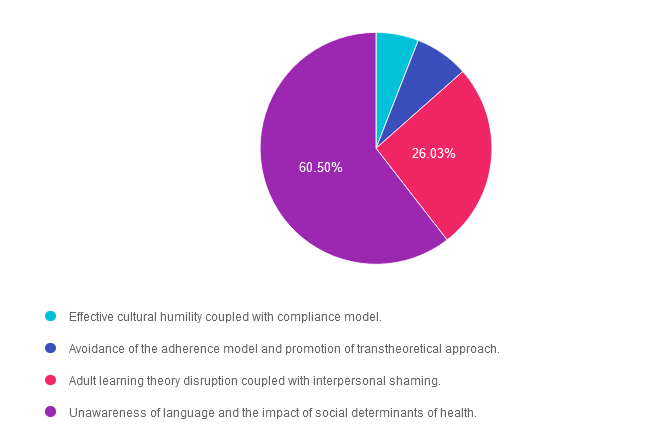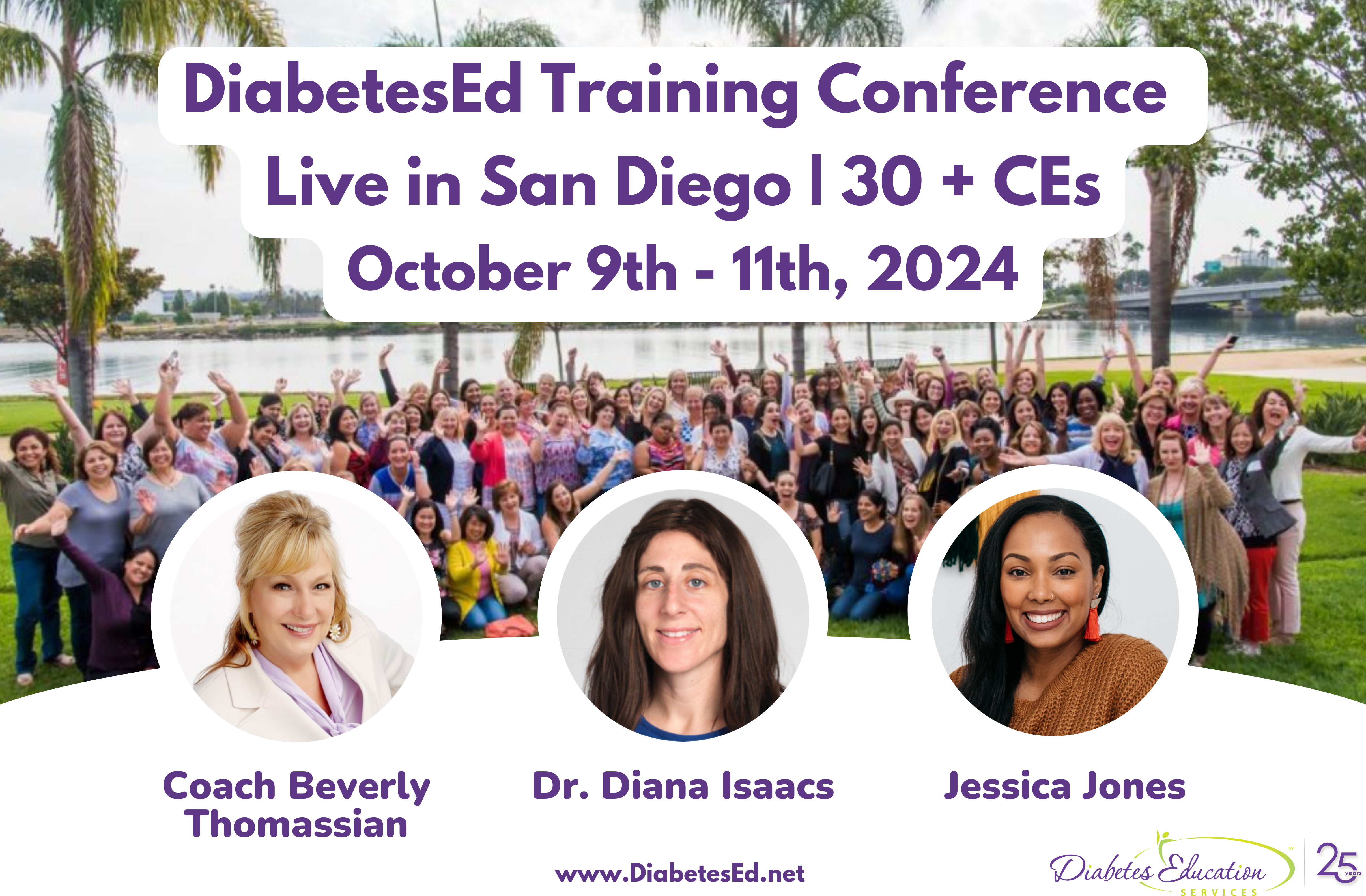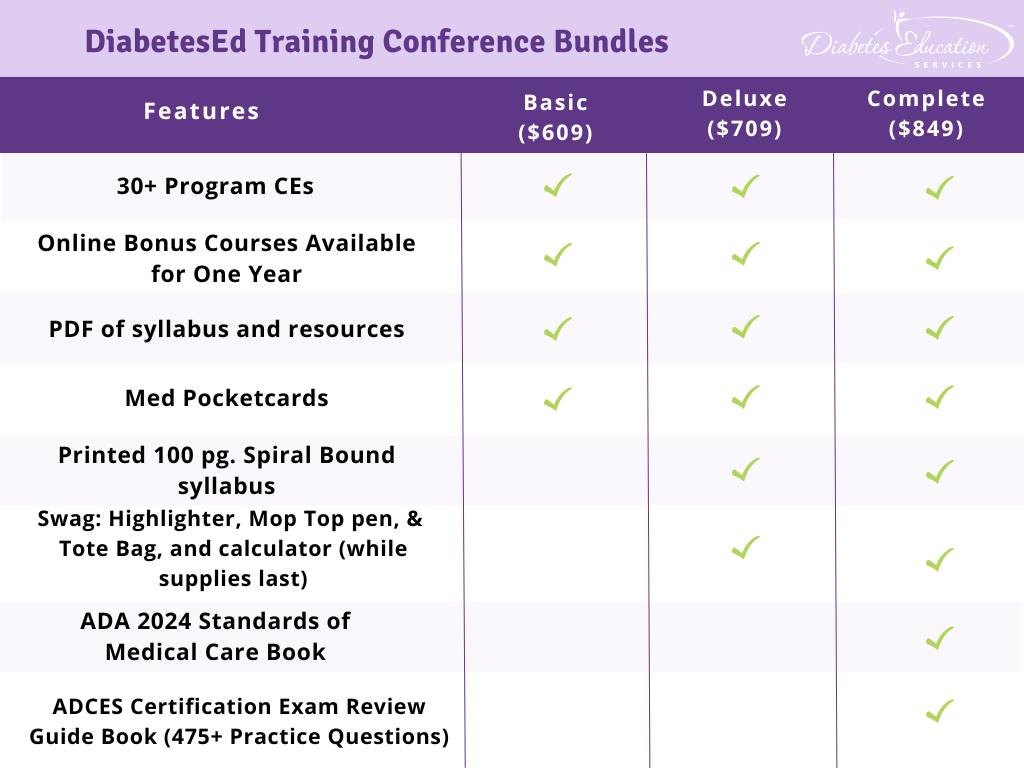
Subscribe
eNewsletter

Ready to get certified?
Free CDCES Coach App
Download
Free Med Pocket Cards

eNewsletter

Free CDCES Coach App
Free Med Pocket Cards

For this month’s newsletter, we want to share articles of hope and value for our community.
Our first article highlights a new framework for providing diabetes self-management education and increasing those cherished “AHA” moments. As part of the team researching the effectiveness of the AH-HA framework, I’m sold on this simple and effective approach to encouraging self-discovery. The AH-HA program incorporates the 5 M framework, developed by Martha Funnell and team, creating an atmosphere of collaboration and empowerment for program participants. We have outlined the AH-HA program and invite you to experiment with this fresh approach when working with individuals or in group settings.
If you are looking for simple summer strategies to boost health, we have outlined three actions people with diabetes can take to improve their well-being. These achievable actions that are easy to kick-start and will provide blood glucose and health benefits long after summer fades into fall.
We invite you to join us in celebrating Bryanna’s August birthday. For the past 4 years, Bryanna has been a beacon of leadership, serving as our Director of Operations and visionary Customer Experience Advocate. Her recent initiatives, such as revitalizing our shopping cart images and reinforcing our commitment to inclusion and advocacy, have been truly inspiring. To kick off her birthday celebration, she suggested a $100 off summer sale, a suggestion we wholeheartedly embraced. And of course, we made sure her beloved cats, Biscuit and Muffin, were included in the celebration.
More good news. We are overjoyed to welcome Tiffany as the new Customer Advocate and Administrative Assistant to our team. Her calm and caring personality and her depth of knowledge of social media and education companies make her a fantastic addition to our team. As we continue to expand our community outreach, you will notice a revitalization of our Instagram platform and our Facebook CDCES Prep Page thanks to Tiffany’s hard work.
We celebrate our community every day and are deeply appreciative for all the hard work and dedication you put into improving diabetes care. Your efforts do not go unnoticed and we are truly grateful for your contributions.
Warmly, Coach Beverly, Bryanna, Tiffany, and Christine |
Featured Articles
Upcoming Webinars

|
We love her wicked sense of humor, organizational skills, and extensive knowledge, all packaged together with her big-hearted humanity. Bryanna is also the proud mama of Biscuit and Muffin, who she often features as the feline stars in her “Cat Bakery.” Thank you, Bryanna, for your generosity and for leading our team with your expertise, humanity, and kindness. |

Accreditation: Diabetes Education Services is an approved provider by the California Board of Registered Nursing, Provider 12640, and our CPEU courses have received Prior Approval* from the Commission of Dietetic Registration (CDR), Provider DI002. Since our CPEU courses received Prior approval* from the CDR, these CPEU courses satisfy the CE requirements for the CDCES /BC-ADM regardless of your profession!
The use of DES products does not guarantee the successful passage of the certification exam. CBDCE and ADCES do not endorse any preparatory or review materials for the CDCES or BC-ADM exams, except for those published by CBDCE & ADCES.
The use of DES products does not guarantee the successful passage of the certification exam. CBDCE and ADCES do not endorse any preparatory or review materials for the CDCES or BC-ADM exams, except for those published by CBDCE & ADCES.
by Christine Craig, MS, RDN, CDCES
The vibrant food, music, and culture of New Orleans, along with networking opportunities, were undoubtedly highlights of ADCES 24 this year. Thought-provoking sessions on health equality, disordered eating in diabetes, and strategies to prevent therapeutic inertia made ADCES 24 an enriching experience for all attendees.
Three key topics emerged on advancements aimed at improving individualized care management and actively shaping the future of diabetes care.

Artificial Intelligence (AI) is here to stay.
Diabetes care and education specialists will benefit from an improved understanding of the applications and integrations available at our disposal. Integrating AI into clinical practice offers significant potential for personalized patient care, especially in managing chronic conditions like diabetes. AI-powered tools can analyze vast datasets to identify patterns and provide tailored recommendations, enhancing the precision of nutritional guidance and diabetes management plans. However, challenges remain, particularly when ensuring the quality of AI systems. These models may lack diversity, leading to biases affecting data accuracy and recommendations.
Addressing AI biases is crucial to ensure AI tools support equitable healthcare delivery and foster better outcomes for all individuals with diabetes.
Whole Person Care – CV Risk Calculator
As our Standards of Care suggest, whole-person diabetes care involves going beyond glucose management and focusing on whole-body systems. Cardiovascular metabolic kidney (CKM) syndrome requires a multifaceted approach, targeting the interconnected risk factors of cardiovascular disease, diabetes, and kidney dysfunction.1 Published in 2023, the PREVENT calculator,2 developed by the American Heart Association Cardiovascular-Kidney-Metabolic Scientific Advisory group, provides a 10-year and 30-year risk estimate for CVD, ASCVD, and heart failure. The PREVENT equation considers cardiovascular and other risk factors such as urine albumin-to-creatinine ratio, A1C, or social determinants of health (zip code). We can utilize this risk calculator, but to address cardio, metabolic, and renal disease we can merge the health care silos and offer integrative, comprehensive care models and treatment plans.
By Christine Craig, MS, RDN, CDCES
Type 1 Diabetes Key Updates
There are exciting advances in type one diabetes management including technology, organizational updates, and a focus on progression prevention. The latest advancements in automated insulin delivery (AID) technologies and new partnerships expand options for individuals with diabetes. These advances and additions to the competitive market are crucial for enhancing patient care and offering personalized management strategies.
On June 4th, 2024, JDRF became Breakthrough T1.3 This name change reflects the breakthroughs in research, access, and education and represents the diversity in the age of those living with type 1 diabetes. Prevention of type 1 diabetes progression is focused on immunotherapy approaches, aiming to preserve beta-cell function and delay the onset of the disease. Clinical trials have shown promise with therapies such as teplizumab-mzwv, an anti-CD3 monoclonal antibody, which has been approved by the FDA to delay the onset of type 1 diabetes in individuals at high risk. Early screening and identification of at risk through genetic and immunological markers are also being integrated into clinical practice, allowing for earlier intervention and more personalized prevention plans.
A new Consensus paper published in June of 2024 provides “Guidance for monitoring individuals with islet autobody-positive pre-stage 3 type 1 diabetes”.4 The paper reviews education, monitoring, and treatment initiation recommendations and discusses psychological support systems. This consensus notes that monitoring of stage 1 Type 1 Diabetes will most likely take place within primary care offices; however, specialists may be needed to support stage 2 monitoring and education. There will be new ICD-10 codes to allow improved monitoring of islet autobody-positive pre-stage individuals to ensure appropriate tracking and treatment when required. These developments reflect an emphasis on not just managing type 1 diabetes but actively working to prevent its progression and improve the quality of life for those at risk.
As diabetes care and education specialists, staying informed and engaged with the latest tools and approaches can improve quality of care. I encourage you to delve deeper into these topics, explore how AI can enhance your practice, integrate comprehensive care models like CKM into management, and keep abreast of the latest developments in type 1 diabetes treatment and prevention.
Together, we can continue to elevate the standard of care and improve outcomes for all individuals living with diabetes.
1. Krentz A, et al. Rising to the challenge of cardio-renal-metabolic disease in the 21st century: Translating evidence into best clinical practice to prevent and manage atherosclerosis. Atherosclerosis. Volume 396, 2024. https://doi.org/10.1016/j.atherosclerosis.2024.118528.
2. PREVENT Calculator: https://professional.heart.org/en/guidelines-and-statements/prevent-calculator
3. Breakthrough T1: https://www.breakthrought1d.org/
4. Phillip M. et al. Consensus Guidance for Monitoring Individuals with Islet Autoantibody–Positive Pre-Stage 3 Type 1 Diabetes. Diabetes Care. July 2024; 47(8):1276–1298. https://doi.org/10.2337/dci24-0042
Accreditation: Diabetes Education Services is an approved provider by the California Board of Registered Nursing, Provider 12640, and our CPEU courses have received Prior Approval* from the Commission of Dietetic Registration (CDR), Provider DI002. Since our CPEU courses received Prior approval* from the CDR, these CPEU courses satisfy the CE requirements for the CDCES /BC-ADM regardless of your profession!
The use of DES products does not guarantee the successful passage of the certification exam. CBDCE and ADCES do not endorse any preparatory or review materials for the CDCES or BC-ADM exams, except for those published by CBDCE & ADCES.
Jessica Jones, MS, RDN, CDCES, is a nationally recognized Registered Dietitian Nutritionist and Certified Diabetes Care & Education Specialist committed to making nutrition education accessible to everyone. As the CEO and co-founder of Diabetes Digital, Jessica has been pivotal in developing an innovative telehealth platform that provides tailored nutrition counseling for individuals with diabetes and prediabetes.

My approach to medical nutrition therapy is all about centering the individual—because they’re the experts on their own life! My job is to support them and offer practical tools for whatever they’re navigating. Instead of laying down a list of what someone “should” do, I always ask if I can share information and then work with them to figure out the next best (and realistic!) step. And if someone isn’t sure where to start, I’ll give them a menu of options so they can decide what feels doable.
I’m also a big fan of motivational interviewing, using things like reflecting and rolling with resistance to help people tap into their own inner drive.
As a Black dietitian, I strongly advocate for cultural humility in healthcare. I love working with diverse communities and learning about different foods and traditions. It’s important that people feel empowered to include their favorite cultural foods in ways that support their health without losing the joy and connection that food brings to their lives. I also practice from a Health at Every Size (HAES) perspective because everyone deserves access to healthcare, the opportunity to pursue health, and to be treated with respect—no matter their size.
I focus on building a healthy relationship with food by encouraging intuitive eating and body respect.
Honestly, I never thought I had a shot at becoming a CDCES until about ten years ago when Beverly gave an in-service at my job and taught us about diabetes. I still remember the stuffed pancreas toy that she used to demonstrate beta cell destruction. After her talk, I chatted with my supervisor and realized that my work at my primary care clinic counted towards my CDCES hours. Most of the people we served had a history of diabetes or prediabetes, and I was already providing counseling and sharing tips to help improve A1Cs.
Once I completed the required hours and my supervisor signed off, I signed up for Beverly’s DiabetesEd 3-day live training program in Carmel, California. As a dietitian, I was so nervous and intimidated by all the diabetes medications and insulin. But that course gave me all the tools I needed and helped me focus on what to study.
I was thrilled to pass the exam on my first try in 2016.
Since then, I’ve worked in various settings with countless individuals. The joy of seeing them improve their health, lower their A1c, and build a healthy relationship with food has been the one of the most fulfilling parts of my journey.
Wendy Lopez and I started our companies because we saw a huge gap in how people, especially those from diverse backgrounds, were being supported around their health. We’re both dietitians (MS, RD, CDCES) with over 20 years of combined experience, and we’ve worked in all sorts of settings—UCSF, NYC Department of Health, Alameda Health System, Columbia/New York Presbyterian—you name it.
Through all of this, we kept seeing the same issues: outdated, one-size-fits-all advice that often wasn’t culturally relevant and sometimes even pushed people toward disordered eating patterns.
About 12 years ago, we decided to change the narrative by creating Food Heaven—a platform where wellness meets social justice. With Food Heaven, we’ve reached millions, breaking down how food, culture, and health are deeply connected and showing that there’s more than one way to be healthy. But as we continued our work and our audience grew, we felt a pull to go deeper into our roots in diabetes education and provide even more focused support for those living with diabetes.
That’s how Diabetes Digital came to life. With Diabetes Digital, we wanted to create an accessible space where diabetes care helps people thrive—not just manage numbers. We offer 1:1 diabetes nutrition counseling (covered by insurance!) through our team of diverse registered dietitians who are not only experts in diabetes care but also committed to culturally inclusive, weight-inclusive, and person-centered approaches.
How much time do we have? Because I have a lot of hobbies and I definitely live to eat! My favorite food is Eritrean/Ethiopian cuisine—lucky for me, I married an Eritrean man! His mom is an amazing cook and often sends us home with delicious leftovers like homemade Injera, Shiro (chickpeas), Hamli (greens), and Timtimo (lentils).
As for hobbies, I’m currently doing improv, which is absolutely terrifying, but I’m doing it anyway—that’s my motto for my 40s! I also recently took a stand-up comedy course and performed a 7-minute routine at a comedy club… in front of a live audience. (Hey, what doesn’t kill you makes you stronger, right?) Besides that, I love anything related to real estate, home decor, gardening, travel, and animals. My dream career is to be a dog sitter, and hopefully, I will get there in retirement!
The use of DES products does not guarantee the successful passage of the certification exam. CBDCE and ADCES do not endorse any preparatory or review materials for the CDCES or BC-ADM exams, except for those published by CBDCE & ADCES.

Victoza is now available in generic form at a slightly reduced monthly price of $469.60 for a 2-pack and $704.40 for a three-pack. According to the ADA average wholesale price chart, Victoza typically costs around $1,340 for a month’s supply, which is about a 50% reduction in price.
Victoza (liraglutide injection 1.8 mg) is a once-daily GLP-1 injection approved to treat type 2 diabetes. It lowers A1C by about 1%, along with weight loss and reduced risk of cardiovascular events. See our Medication PocketCards for more info.
Generic Victoza, produced by Teva Pharmaceuticals, is the first GLP-1 RA that has gone generic. Victoza’s patent in the US and Europe expired in late 2023, paving the way for companies like Teva to pursue generic versions. Two other generic Victoza options are being developed with a possible December 2024 release date. Once multiple Victoza generics are on the market, the hope is that competition will further reduce prices for people who would benefit from this medication. Patents for newer GLP-1 medications like Ozempic and Wegovy won’t expire until several years later.
Launching this more cost-effective generic Victoza comes as many people with diabetes struggle to access the more popular GLP-1 medications like semaglutide (Ozempic) and dulaglutide (Trulicity). Liraglutide (Victoza) was also approved for weight loss for those without diabetes who met the BMI criteria in 2014 under the brand name Saxenda.
The first generic GLP-1 is a significant milestone in improving access to diabetes drugs. With the launch of additional Victoza generics in 2025 and beyond, prices should continue to fall even further, helping more people access these crucial medications.
This month, the FDA approved another SGLT-2i, dapagliflozin (Farxiga), for children under the age of 18. Dapagliflozin and empagliflozin are now both approved for pediatrics starting at the age of 10 diagnosed with type 2 diabetes as an adjunct to diet and exercise to improve glycemic control.
The incidence and prevalence of type 2 diabetes in children and adolescents are increasing globally. In the US, there are nearly 30,000 individuals under the age of 20 living with type 2 diabetes, with 5,300 new cases diagnosed each year, according to the US Centers for Disease Control and Prevention and recent research. Children with type 2 diabetes often experience earlier onset of complications than adults and benefit from interdisciplinary care and social support.
Data from the T2NOW Phase III trial, published in The New England Journal of Medicine Evidence, Farxiga, provided clinically meaningful improvements in glycemia for children and adolescents with type 2 diabetes. The safety results in this pediatric population were consistent with those in adults with T2D. Of course, it is essential to provide education on preventing genital infections and any signs of diabetes ketoacidosis. See our Medication PocketCards
The use of DES products does not guarantee the successful passage of the certification exam. CBDCE and ADCES do not endorse any preparatory or review materials for the CDCES or BC-ADM exams, except for those published by CBDCE & ADCES.

People of color living with diabetes are at increased risk of lower extremity complications and amputations. Ankle-Brachial Index (ABI) measures lower extremity vessel disease in individuals with diabetes and is an important tool to evaluate risk of future complications.
Which of the following is true regarding ABI?

Coach Beverly will walk participants through the 3-Step Process to Save Feet; Assess, Screen, & Report. She will provide simple and clear instructions on how to assess and inspect feet, along with risk assessment & action steps. We will share free teaching tools, strategies, & documentation forms adapted from the Lower Extremity Prevention Program (LEAP) that you can immediately implement in your practice setting.
Objectives:
According to a 2019 article published in Diabetes Care, the rate of amputations in the U.S. is increasing. Each year, people with diabetes experience approximately 200,000 non-traumatic amputations. African Americans are 4 times more likely to experience diabetes-related amputation than whites. In the United States, every 17 seconds someone is diagnosed with diabetes, and every day 230 Americans with diabetes will suffer an amputation.
We can make a difference and help reverse this trend. Basic foot care assessment and education can reduce the risk of amputation by over 50 percent. By assessing and screening for loss of protective sensation with a monofilament, diabetes healthcare professionals can immediately identify high-risk feet and take steps to protect lower extremities
We are excited to share this life-saving information with our community of diabetes advocates.
Learning Outcome:
Diabetes team members will gain the skills and knowledge needed to provide a basic lower extremity assessment and provide individualized education to protect against lower extremity complications in diabetes.
Target Audience:
This course is a knowledge-based activity designed for individuals or groups of diabetes professionals, including RNs, RDs/RDNs, Pharmacists, Nurse Practitioners, Clinical Nurse Specialists, Physician Assistants, and other healthcare providers interested in staying up to date on current practices of care for people with prediabetes, diabetes, and other related conditions. The practice areas for RDs/RDNs for CDR reporting are healthcare, preventative care, wellness, and, lifestyle along with, education and research.
CDR Performance Indicators:
Instructor: Beverly Thomassian RN, MPH, CDCES, BC-ADM is a working educator and a nationally recognized diabetes expert.
Accreditation: Diabetes Education Services is an approved provider by the California Board of Registered Nursing, Provider 12640, and our Level 4 | 3 Steps to DeFeet Amputation; Assess, Screen, & Report awards 1.0 CPEUs in accordance with the Commission on Dietetic Registration’s CPEU Prior Approval Program.
The use of DES products does not guarantee the successful passage of the certification exam. CBDCE and ADCES do not endorse any preparatory or review materials for the CDCES or BC-ADM exams, except for those published by CBDCE & ADCES.
For last week’s practice question, we quizzed participants on avoiding ingrown toenails. 61% of respondents chose the best answer. We want to clarify and share this important information, so you can pass it on to people living with diabetes and your colleagues, plus prepare for exam success!
Before we start though, if you don’t want any spoilers and haven’t tried the question yet, you can answer it below: Answer Question

Question: JR lives with type 2 diabetes and works 10-11 hours a day driving a tractor for a local farm. It is difficult for JR to make medical appointments since their employer has very strict attendance guidelines. JR has ingrown toenails in the big toes, that cause a great deal of pain. Since they didn’t have time to come in for care, JR cut off half of their toenails on both feet to prevent an ingrown nail. As you inspect JR’s feet, you see that their big toes are swollen and red. You ask the provider to evaluate JR’s feet because you are worried. After the provider evaluates JR’s feet, they turn to JR and say, “Diabetics should never cut their toenails like this. It causes infection”.
What is this an example of?
Answer Choices:

Answer 1 is incorrect. 5.94% chose this answer. “Effective cultural humility coupled with compliance model.” The provider’s response was not culturally humble or thoughtful of JR’s economic circumstance or social determinants of health. This provider could benefit from coaching on how to use a strength based approach coupled with addressing individuals with respect and person-centered language. Watch our “Language Matters” FREE Webinar for helpful information.
Answer 2 is incorrect. 7.53% of you chose this answer. “Avoidance of the adherence model and promotion of transtheoretical approach.” The provider’s response was based on the old fashioned compliance model. The provider was not thoughtful of JR’s readiness for change or their circumstance. This provider could benefit from coaching on how to use a strength based approach coupled with addressing individuals with respect and person-centered language. Watch our “Language Matters” FREE Webinar for helpful information.
Answer 3 is incorrect. About 26.03% of respondents chose this. “Adult learning theory disruption coupled with interpersonal shaming.” The provider’s response did not consider the expertise of the individual or adult learning theory, so they didn’t disrupt adult learning theory because they never initiated it. The provider did speak to JR using shame based language and the word “should”. Watch our “Language Matters” FREE Webinar for helpful information.
Finally, Answer 4 is correct. 60.50% chose this answer. “Unawareness of language and the impact of social determinants of health.” YES, this is the best answer This provider could benefit from coaching on how to use a strength based approach coupled with addressing individuals with respect and person-centered language. Watch our “Language Matters” FREE Webinar for helpful information.
We hope you appreciate this week’s rationale! Thank you so much for taking the time to answer our Question of the Week and participate in this fun learning activity!

Join Coach Beverly and Team for two and a half days of knowledge-sharing, fun, networking, games with prizes, and “aha” moments in beautiful San Diego on October 9-11, 2024.
You don’t want to miss this one-of-a-kind learning opportunity. Get away from all those daily responsibilities and immerse yourself in a fun and intensive conference with plenty of networking opportunities.
Attendees will leave this conference with new tools and a more complete understanding of the latest advances in diabetes care, from medications to technology to Medical Nutrition Therapy!
Each day, we provide a healthy breakfast, including fresh coffee, to kick off your morning. Our instructors co-teach the content to keep things fresh and lively. Plus, we play DiaBingo to reinforce key content. In addition, we provide plenty of movement breaks led by volunteers from the audience. Did we mention delicious lunches and a conference meeting space just minutes from San Diego Bay?
Friend Discount: 3 or more only $559-$799 (based on registration package) per person. Email us at [email protected] with the name and email of each registrant to get the discount!

Time: The course is Wednesday through Friday. Join us for breakfast at 7:00 a.m. each day. The class begins at 8:00 a.m. and ends at 5:00 p.m. on Wednesday and Thursday and at 3:00 p.m. on Friday.
Accreditation: Diabetes Education Services is an approved provider by the California Board of Registered Nursing, Provider 12640, and our CPEU courses have received Prior Approval* from the Commission of Dietetic Registration (CDR), Provider DI002. Since our CPEU courses received Prior approval* from the CDR, these CPEU courses satisfy the CE requirements for the CDCES /BC-ADM regardless of your profession!
The use of DES products does not guarantee the successful passage of the certification exam. CBDCE and ADCES do not endorse any preparatory or review materials for the CDCES or BC-ADM exams, except for those published by CBDCE & ADCES.

We will award two diabetes educators who provide care and education to under-served communities that lack access to Diabetes Specialists and healthcare resources. Applicants will be taking their CDCES exam within a year. Each scholarship covers course registration for our Live in San Diego: DiabetesEd Training Conference Registration and 3 nights hotel stay.
*These scholarships cover the course registration fee and 3 nights hotel stay. It does not cover any other expenses incurred by the winners (including travel expenses, food, transportation, etc.). Please consider travel and other costs prior to applying for the scholarship. Each applicant must currently reside within the United States. If you are interested, please click on the button below to complete the scholarship application.
The goal of these scholarships is three-fold:
Flower Scholarship: This scholarship is awarded to Diabetes Nurse Educators and is available because of the generous contribution of an anonymous colleague, friend, co-instructor, and mentor. Our donor worked as a Nurse Practitioner and Diabetes Specialist, serving her community, plus mentoring healthcare professionals about diabetes for over 30 years. With the Flower Diabetes Educator Scholarship, she wants to keep investing in the health of our future by supporting future diabetes educators.
“Making a Difference” Scholarship: Diabetes Education Services is committed to improving equity and access to diabetes training and education for a diverse group of healthcare professionals. We don’t want financial barriers to stop anyone from attending this conference. In appreciation of those who are role models and advocates for practicing the best diabetes care in their communities
These scholarships are available due to the generous contribution of diabetes colleagues, friends, co-instructors, and mentors.
“Making a Difference” Scholarship Donor – Lonnie Vaughn, RNC, BSN, CDCES

Our esteemed donor for the Making a Difference Scholarship, Lonnie, possesses a profound understanding of the challenges that diabetes care and education specialists face in the healthcare setting. As a leader in the field of diabetes management, Lonnie has been championing best care practices at Doctors Medical Center in Modesto for over 30 years. Her role as a certified diabetes educator, trainer, mentor, and advocate is recognized and celebrated by patients and professionals, underscoring the unique value she brings to the cause.
Lonnie’s Vision: Lonnie wants to lift the next generation of diabetes care and education specialists to advocate for under-resourced individuals and fight for evidence-based, compassionate care for ALL people living with diabetes.
A note from Coach Beverly: I met Lonnie over 25 years ago at a conference where I was presenting on diabetes care. Her curiosity and passion for the topic were reflected in her attention, thoughtful questions, and dedication to her community. I invited her to join our live conference team to teach, coordinate, and share her passion and energy for the best diabetes care. She not only rose to the challenge, she surpassed all expectations and became an integral part of our Diabetes Education Services family. Lonnie’s impact on the community is immeasurable. She has mentored and trained over a dozen CDCESs (and hundreds of interns) at Doctors Medical Center, investing in the future of this honorable and essential profession. I am deeply grateful for Lonnie’s years of generous contributions and dedication to ushering in the next generation of diabetes care and education specialists. Thank you, Ms. Lonnie Vaughn, for being such a bright and present light in the world of diabetes care and education.

Our donor for the Flower Scholarship worked as a Nurse Practitioner and Diabetes Specialist, serving her community, plus mentoring healthcare professionals about diabetes for over 30 years.
With the Flower Diabetes Educator Scholarship, she wants to keep investing in the health of our future by supporting future diabetes educators.
Her vision is to increase diversity in the diabetes education workforce by supporting diabetes nurse educators who come from underserved communities. By increasing the number of diabetes educators who represent the population demographics of those living with diabetes, we can make more meaningful connections on an individual and community level while promoting the best care.
The Flower Scholarship is a tribute to our donor’s last name, which translates to flower. The flower is a perfect symbol for this scholarship that aims to support the growth of novice diabetes educators into Certified Diabetes Care and Education Specialists.
Flowers are a symbol of hope and can be found growing in the most unexpected places, including harsh cities and forgotten spaces. With just a little sunlight and water, they have the ability to thrive in even the most difficult situations and shine their fierce beauty. Given a chance, as these flowers are tended to and nurtured, they grow stronger and brighter, spreading their beauty to new places to give people hope. These resilient flowering seeds perpetuate the opportunity for a future generation of diabetes specialists.
Past Scholarship Recipients

Accreditation: Diabetes Education Services is an approved provider by the California Board of Registered Nursing, Provider 12640, and our CPEU courses have received Prior Approval from the Commission of Dietetic Registration (CDR), Provider DI002.
Since our CPEU courses received Prior approval from the CDR, these CPEU courses satisfy the CE requirements for the CDCES /BC-ADM regardless of your profession!
The use of DES products does not guarantee the successful passage of the certification exam. CBDCE and ADCES do not endorse any preparatory or review materials for the CDCES or BC-ADM exams, except for those published by CBDCE & ADCES.
**To satisfy the requirement for renewal of certification by continuing education for the Certification Board for Diabetes Care & Education (CBDCE), continuing education activities must be applicable to diabetes and approved by a provider on the CBDCE List of Recognized Providers (www.cbdce.org). CBDCE does not approve continuing education. Diabetes Education Services is accredited/approved by the Commission of Dietetic Registration which is on the list of CBDCE Recognized Providers.

JR is taking Metformin 1000mg BID but is worried about getting cancer and is thinking about stopping the metformin.
Which of the following is an accurate statement regarding diabetes, metformin and cancer?

Patients with cancer often experience hyperglycemia secondary to treatment, which can increase the risk of infection & compromise their nutritional status. In addition, recent research has identified the link between diabetes & cancer. Join us to learn more about this unexpected link & treatment strategies for steroid-induced hyperglycemia using a case study approach.
Objectives:
Learning Outcome:
Participants will have an increased understanding of the relationship between hyperglycemia and cancer based on person-specific factors and will be able to discuss treatment approaches.
Target Audience:
This course is a knowledge-based activity designed for individuals or groups of diabetes professionals, including RNs, RDs/RDNs, Pharmacists, Nurse Practitioners, Clinical Nurse Specialists, Physician Assistants, and other healthcare providers interested in staying up to date on current practices of care for people with prediabetes, diabetes, and other related conditions. The practice areas for RDs/RDNs for CDR reporting are healthcare, preventative care, wellness, and, lifestyle along with, education and research.
CDR Performance Indicators:
Instructor: Beverly Thomassian RN, MPH, CDCES, has been Board Certified in Advanced Diabetes Management for over 15 years. She is an Associate Clinical Professor at UCSF, a working educator, and a nationally recognized diabetes expert.
Accreditation: Diabetes Education Services is an approved provider by the California Board of Registered Nursing, Provider 12640, and our Level 4 | Cancer & Diabetes awards 1.25 CPEUs in accordance with the Commission on Dietetic Registration’s CPEU Prior Approval Program.
The use of DES products does not guarantee the successful passage of the certification exam. CBDCE and ADCES do not endorse any preparatory or review materials for the CDCES or BC-ADM exams, except for those published by CBDCE & ADCES.